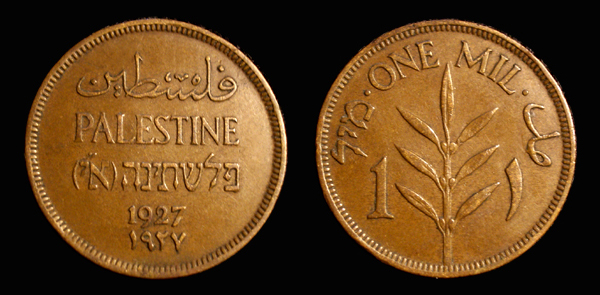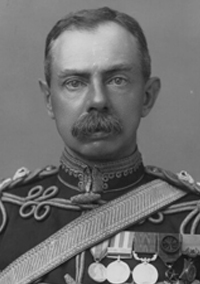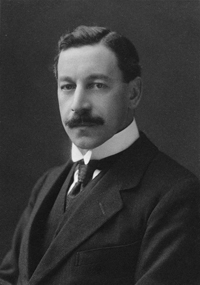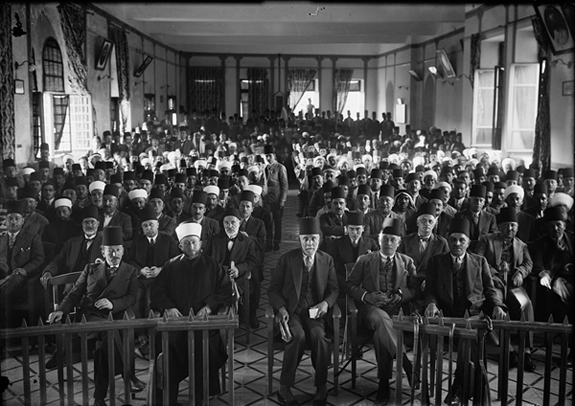
1 MIL COIN - BRITISH MANDATORY PALESTINE
(KM 1)
Date: A.D. 1927
Obverse: 'Palestine' in Arabic, English and Hebrew with date - In Hebrew script, in parentheses, is the acronym for 'Land of Israel'
Reverse: Olive Branch - Value in Hebrew, English and Arabic
|
This is a bronze 1 Mil coin minted by the British Mandate of Palestine. The coin depicts an olive branch and states the name of Palestine and the denomination in three languages: English, Hebrew and Arabic. In parentheses, there is an acronym that stands for "The Land of Israel" placed before the name Palestine in Hebrew. This is a reference to the stated goal of the Mandate of Palestine to create a national home for the Jews in this territory. This coin was minted to provide currency to the former Ottoman Territory of Syria which was placed under British administration after World War I. This coin is trilingual (English, Hebrew and Arabic) as this was still relatively early days in a contest for land between Arabs and Jews in the Levant that still continues today. Although the British Mandate clearly called for the creation of a Jewish homeland from this territory, It also called for protections for Arabs (and all religions) so British administrators and military usually sought to mediate and placate both sides. The olive branch represents peace which might characterize British sentiments at the time. All British administrators were not of one mind on Arabs vs Jews but to a man they wanted to bring order to the territory and keep the peace while fulfilling their mandate. The denomination of Mil (or Mill) comes from the Latin "millesimum" meaning "thousandth part" and was used mostly by British influenced nations, territories, and protectorates like Palestine, Israel, Egypt, Jordan, Hong Kong, Cyprus and Tunisia. Today it is largely a notational unit sometimes used in accounting to denote 1/1000 of 1 unit of currency. In the US the term was used as far back as the Continental Congress (1786) to denote "The lowest money of account" - 1000th part of a federal dollar. No coins were minted in the United States using this denomination although some states did issue tokens using this denomination (often related to sales tax) as late as the 1960s. "That the money of account of the United States shall be expressed in dollars or units, dismes or tenths, cents or hundredths, and milles or thousandths, a disme being the tenth part of a dollar, a cent the hundredth part of a dollar, a mille the thousandth part of a dollar, and that all accounts in the public offices and all proceedings in the courts of the United States shall be kept and had in conformity to this regulation." Coinage Act of 1792 British Mandatory Palestine (Mandate for Palestine) This coin was minted in 1927 by British Mandatory Palestine, a territory created by the League of Nations with the Mandate for Palestine effective in 1923. The coin was introduced in 1927 as an effort to bring monetary stability by replacing the Turkish lira and the Egyptian pound which were competing currencies circulating at the time. To this end the Currency Board for Palestine and the Palestine pound were established and decimal paper currency and coinage were issued. When this coin was minted, Mandatory Palestine was governed by the High Commissioner Field Marshall Herbert Charles Onslow Plumer (Viscount Plumer). Plumer was a old veteran of many wars and battles, a holder of many medals from many commands across the British Empire and during World War I. He was an itinerant soldier since he first entered the service in 1876 as a young lieutenant to serve in the 65th Regiment of Foot at the age of 19. A field marshal by 1919, Plumer was appointed as High Commissioner in 1925 tasked with organizing British Palestine which was already experiencing clashes between the Arab population and the ever increasing population of Jewish settlers whose numbers significantly spiked the year he took office. British Mandatory Palestine was created after World War I by the League of Nations Mandate for Palestine and Transjordan that set these former holdings of the Ottoman empire under British administration. The First High Commissioner for Palestine was Sir Herbert Louis Samuel who took over from a military controlled administration on July 1, 1920. Samuel was a somewhat controversial choice as he was Jewish, the first to serve as a British cabinet member and the first to govern the historic land of Israel for several thousand years. To have a pro-Zionist in this role would be seen by Jews as a great boon to their cause of creating Israel anew and by Arabs as a sign of a Zionist takeover of Palestine with the consent of the British. On the British side he was seen as a good choice by some to institute the objective put forth in the Balfour Declaration while some in the military, and some others in the government, saw his appointment as "highly dangerous." A comment published in the conservative Morning Post stated: "[Samuel's] appointment as High Commissioner was regarded by everyone, except the Jews, as a serious mistake." Samuel was instrumental in pushing British support for the establishment of the Zionist's 'National Homeland' in this area, even before war was declared on the Ottoman Empire in 1914. He would enter the office of High Commissioner with an expectation by the Jewish population in Palestine that he would move forward with the Jewish National Homeland as per the Balfour Declaration of 1926 that clearly states: "His majesty's government view with favour the establishment in Palestine of a national home for the Jewish people, and will use their best endeavors to facilitate the achievement of this object" The Mandate for Palestine incorporates the Balfour Declaration thus making the creation of a Jewish Homeland a legally binding initiative for any High Commissioner including Field Marshall Plumer who replaced Herbert Samuel in August of 1925. Plumer, like most of the old soldiers who took the job of High Commissioner in Palestine, did his best to forward the establishment of the Jewish homeland while trying to placate an Arab population that felt slighted and marginalized from the start. Early on the terms of the Mandate, the growing immigration of Jews to Palestine and the perceived favoritism shown to the Jewish population by the British administration, engendered anti-Zionist and anti-British sentiment among the Arab Palestinian population. This would give rise to a Nationalist / Anti-Zionist Palestinian movement manifesting its discontent in the form of Arab resistance, strikes, riots, terrorist acts and armed conflict for generations.
|



